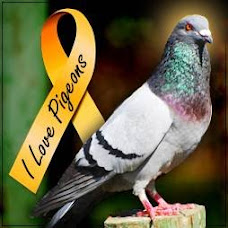
Sun Washington Post Staff Writer - Lena H.
B01Metro
Tuesday, July 31, 2007
We Didn't Mean for You to Find Out We Kill Birds
After word got around Sunday night that several Metro stations had been temporarily closed due to dozens of dead birds appearing around them, Metro officials spent the day yesterday trying to figure out how to explain away the fact that the mistake their contractor had made was not that they had poisoned the birds -- merely that they had poisoned the birds at the wrong time of day, and didn't have a chance to clean up the carcasses before commuters showed up.
In today's Post we see that news traveled quickly to the Humane Society of the United States, who quickly contacted Metro officials and said they'd like to help them find humane ways to keep birds out of stations.
Now Metro says they will consider changing their bird-killing policies. A Metro spokesperson explained that they contract with a local company, Dixon's Pest Control, on an as-needed basis and only as "a last resort" to get rid of birds after customers and employees complain about droppings. The agency says it also uses netting and spikes to control the bird population. Of three other major transit systems polled by the Post, none of them said they use poison to get rid of birds.
It's interesting to note the different standards we apply to different kinds of pests. No doubt far fewer people would object to poisoning rats, which are also a big problem for the city, but pigeons, which carry just as many diseases and leave behind even bigger messes -- well we can't just go killing them, now can we?
B01Metro
Tuesday, July 31, 2007
We Didn't Mean for You to Find Out We Kill Birds
After word got around Sunday night that several Metro stations had been temporarily closed due to dozens of dead birds appearing around them, Metro officials spent the day yesterday trying to figure out how to explain away the fact that the mistake their contractor had made was not that they had poisoned the birds -- merely that they had poisoned the birds at the wrong time of day, and didn't have a chance to clean up the carcasses before commuters showed up.
In today's Post we see that news traveled quickly to the Humane Society of the United States, who quickly contacted Metro officials and said they'd like to help them find humane ways to keep birds out of stations.
Now Metro says they will consider changing their bird-killing policies. A Metro spokesperson explained that they contract with a local company, Dixon's Pest Control, on an as-needed basis and only as "a last resort" to get rid of birds after customers and employees complain about droppings. The agency says it also uses netting and spikes to control the bird population. Of three other major transit systems polled by the Post, none of them said they use poison to get rid of birds.
It's interesting to note the different standards we apply to different kinds of pests. No doubt far fewer people would object to poisoning rats, which are also a big problem for the city, but pigeons, which carry just as many diseases and leave behind even bigger messes -- well we can't just go killing them, now can we?
This isn't to suggest that we think Metro was right. If there are humane alternatives to keeping birds out of Metro stations, then they should be put in place. But based on the information that's come out since Sunday, it looks as though Metro has been quietly killing pigeons and other small birds when they felt they needed to for at least 15 years. Is it really that no one knew about this practice for all that time, or is it more likely that those who are objecting now are just upset about having seen a bunch of dead birds?
Consider Other Ways to Get Rid of Birds
Metro officials said yesterday they might reconsider their longtime policy of poisoning pigeons and starlings after a contractor failed to clean up dead birds at several Metro stations Sunday, closing three stations and stalling trains for hours. After hearing news reports about the poisoned birds, executives of the Humane Society of the United States contacted Metro officials yesterday and offered to discuss more humane ways to keep birds out of stations, according to Maggie Brasted, director of the society's urban wildlife conflict resolution program. "We want to bring them good practical solutions," she said.
Consider Other Ways to Get Rid of Birds
Metro officials said yesterday they might reconsider their longtime policy of poisoning pigeons and starlings after a contractor failed to clean up dead birds at several Metro stations Sunday, closing three stations and stalling trains for hours. After hearing news reports about the poisoned birds, executives of the Humane Society of the United States contacted Metro officials yesterday and offered to discuss more humane ways to keep birds out of stations, according to Maggie Brasted, director of the society's urban wildlife conflict resolution program. "We want to bring them good practical solutions," she said.
"We think that using poison is not very humane." Paul Gillum, director of plant maintenance at Metro, said killing the birds "is not something Metro enjoys doing, but it's sometimes a necessity to provide proper service to our customers." But, he added, he plans to meet with the Humane Society experts. "If there's another way to do business, we will look at it and see if we can make changes."
Metro officials said they have contracted with Dixon's Pest Control of the District for the past 15 years on an as-needed basis to get rid of pesky birds after customers and employees complain about droppings. "Our employees and patrons don't like them being overhead, and there is a tendency for those droppings to get on our Farecard machines . . . and people don't like touching that stuff," Gillum said, adding that Metro uses the poison as a "last resort." The agency also uses netting and spikes to prevent large flocks of birds from roosting, he said.
None of three other major transit agencies contacted yesterday said they use poison to get rid of birds. Officials at the Los Angeles, New York and Philadelphia transit systems said they rely on netting and spikes as their primary methods of controlling nuisance birds. Asked whether New York officials use poison to control the legions of pigeons that flock to the subway, transit agency spokeswoman Deirdre Parker said: "Oh no, no, no, no, no. We would never be able to get away with it." Parker said officials rely on a mild electric shock to get rid of birds.
The poisoning process at Metro begins when the contractor sets out food for two to three weeks to attract birds to a particular location, Gillum said. Once that feeding area has been established, the contractor is supposed to bait the area early on a Sunday morning using Avitrol, a chemically treated bait. The contractor is supposed to monitor during this period to make sure "non-target species" of birds do not eat the poisoned bait, according to the contract. The contract also states that Dixon's is required to use "extreme care and caution" in the poison application "so as not to be hazardous to the health of human beings, warm blooded animals, or songbirds. In addition, food, ground water, or subterranean water, must not be contaminated."
On Sunday, the contractor told Metro officials that it put out poison at one bus garage and seven Metrorail stations: Silver Spring and Takoma on the Red Line, and Prince George's Plaza, Fort Totten, Greenbelt, Naylor Road and Anacostia on the Green Line. The contractor, which was supposed to be finished before 7 a.m., told Metro officials it did not begin until 7:30 a.m., Gillum said. Dead birds were reported at four of those stations: Takoma, Greenbelt, Naylor Road and Anacostia. Gillum said the contractor was able to pick up dead birds at some of the stations immediately but did not have time to go back to the other stations before authorities closed them because of the dead birds.
Metro officials said they could not explain why dead birds were found at two stations -- Branch Avenue and Rhode Island Avenue-Brentwood -- where the contractor had not put out poison.
In 2006, Metro hired Dixon nine times, paying between $213 and $4,000 each time, based on the amount of work. The company's owner, Robert Dixon, did not return a telephone call to his office yesterday. The reports of at least 60 dead birds triggered an immediate response from federal and local officials Sunday, and the FBI's Joint Terrorism Task Force also interviewed Dixon, according to Debbie Weierman, a spokeswoman for the FBI's Washington field office.
Gillum noted that Metro had worked successfully with the Humane Society several years ago to find an alternative to trapping and killing troublesome beavers at the Greenbelt Metro station. Metro ended up using a device known as the beaver deceiver, which tricks beavers into thinking their dams are not working and prompts them to leave, he said.
Staff researcher Meg Smith contributed to this report.
On Sunday, the contractor told Metro officials that it put out poison at one bus garage and seven Metrorail stations: Silver Spring and Takoma on the Red Line, and Prince George's Plaza, Fort Totten, Greenbelt, Naylor Road and Anacostia on the Green Line. The contractor, which was supposed to be finished before 7 a.m., told Metro officials it did not begin until 7:30 a.m., Gillum said. Dead birds were reported at four of those stations: Takoma, Greenbelt, Naylor Road and Anacostia. Gillum said the contractor was able to pick up dead birds at some of the stations immediately but did not have time to go back to the other stations before authorities closed them because of the dead birds.
Metro officials said they could not explain why dead birds were found at two stations -- Branch Avenue and Rhode Island Avenue-Brentwood -- where the contractor had not put out poison.
In 2006, Metro hired Dixon nine times, paying between $213 and $4,000 each time, based on the amount of work. The company's owner, Robert Dixon, did not return a telephone call to his office yesterday. The reports of at least 60 dead birds triggered an immediate response from federal and local officials Sunday, and the FBI's Joint Terrorism Task Force also interviewed Dixon, according to Debbie Weierman, a spokeswoman for the FBI's Washington field office.
Gillum noted that Metro had worked successfully with the Humane Society several years ago to find an alternative to trapping and killing troublesome beavers at the Greenbelt Metro station. Metro ended up using a device known as the beaver deceiver, which tricks beavers into thinking their dams are not working and prompts them to leave, he said.
Staff researcher Meg Smith contributed to this report.












No comments:
Post a Comment